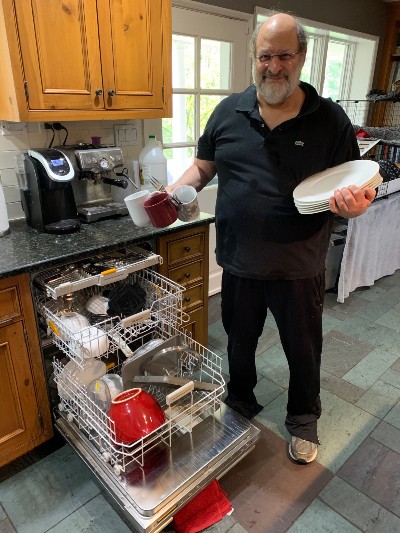Stuart Diamond, an emeritus professor at Wharton, teaches EAS 512: Engineering Negotiations in the Department of Mechanical Engineering and Applied Mechanics and Negotiations at Penn Law. His New York Times bestseller, Getting More, has been called “the best book to read for your career” by the Wall Street Journal’s career site and has sold 1.5 million copies in 27 languages. Diamond was also part of a New York Times investigative reporting team that earned a Pulitzer Prize for their coverage of the Challenger disaster.
After switching to remote teaching during the COVID-19 outbreak, he and his students have gained a newfound appreciation for their course material.

At my self-quarantined house, I now own the dishwasher — filling, emptying. My teenage son Alexander owns the trash and the table — setting, clearing. My wife cooks. We have dinner exactly at 6:00 PM every night. We discuss who gets the internet bandwidth and when.
Getting through the day is a challenge when you are cooped up with family, friends, colleagues and others during the coronavirus pandemic. People are already stressed out; close quarters almost always make it worse. Simple disagreements can cause arguments and resentment.
The negotiation process I teach at Penn focuses on emotional intelligence, perceptions and cultural diversity instead of the more conflictive power, leverage and logic, and it shows how to get more through better connections with others. These tools are especially important for the COVID-19 environment.
After our remote class the other day, my students and I came up with some negotiation and problem-solving tools for our “new normal” based on this model.
Structure
The more you structure your day or week in advance, the fewer arguments and the less stress. A big cause of stress is dashed expectations. Structure clarifies expectations. “Have an agenda,” said student Vraj Shroff, a senior in Economics. “Talk about your class schedule and organize.” This means who watches the TV and when.
Added Saluja Bhava, a graduate student in Computer and Information Science: “Be accountable to each other. Take turns on who cleans the apartment. Review the schedule from time to time.”
Write it down and put it up somewhere, or share it digitally.
Emotional Payments
People are already emotional from our collective situation, so they will lash out at the nearest person, which is often you. But it’s not about you, even if they call you names. They are expressing their pain. Value them, value their emotions. Discuss them. Emotion is one of the biggest causes of conflict and failed goals. Calm the situation down by valuing them and trying not to take things personally. Ask questions about what they are feeling.
A big way to do this to keep mentioning common enemies. “We need to understand everyone is struggling. We might even be doing better than many. How can we help each other cope?” said Jonah Arnheim, a graduate student in Integrated Studies.
Trade Items That Are Unequally Valued
Find out how you can trade things. My course manager, Dana Nattress, has a 9-year-old daughter who is home more, requiring much more time. So it’s OK with me that Dana works at odd hours, including nights. She’s spent her own time learning Zoom, which she manages for the course. Jonah said he has been negotiating with local businesses, making extra money by finding them better ways to sell and ship their products.
Make Human Connections
Life is much more about people than things and data. Ask people’s names on the phone, treat them with respect. How was your day? Instead of complaining about the long telephone wait from my local pharmacy, I commiserated with the pharmacist, Brittany, about how busy she must be. She went out of her way to get me critical medicines faster and didn’t charge me for some alcohol wipes. Find out their perceptions. Value them whether you agree or not. They will listen more and do more things for you in return.
Reduce Their Perceived Risk
“International students and others who can’t go home, their families are really stressed, getting terrible news about the U.S.,” said Dan Lin, a graduate student in Electrical Engineering. “It’s very important to share a lot of details: how we are social distancing, taking school by remote, getting food.” In a risky world, find out their perceptions of risk, and reduce it with details important to them; they will be more comfortable with you. This works with parents and venture capitalists.
Are Your Actions Meeting Your Goals?
Your main goal is to stay alive — or at least not get sick, isn’t it? View everything with this question in mind: how you treat people, organize your day, find things to trade. The best thing about this is that if you learn and practice these things, you will be able to better use them in the next crisis, or even day-to-day life after the virus passes. And people will remember that you treated them better. The returns will last a lifetime.
It’s more important than ever that we amplify one another’s voices and we want to hear from you. Learn more about Penn Engineering’s Share Your Story project here.
